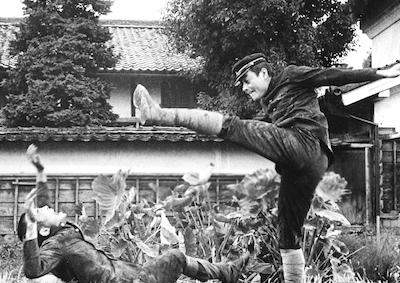Tokyo Nagaremono
Tasked with making a vehicle for actor/singer Tetsuya Watari to croon the title song, director Seijun Suzuki concocted this crazy yarn about a reformed yakuza on the run from his former comrades. The film is mainly an excuse to stage an escalating series of goofy musical numbers and over-the-top fight scenes. Popping with garish colors, self-parodic style and avant-garde visual design, Tokyo Drifter embodies a late-1960s zeitgeist in which trash and art joyfully comingle. “With influences that range from Pop Art to 1950s Hollywood musicals, and from farce and absurdist comedy to surrealism, Suzuki shows off his formal acrobatics in a film that is clearly meant to mock rather than celebrate the yakuza film genre.” —Nikolaos Vryzidis, Directory of World Cinema: Japan.
DCP, b/w & color, in Japanese with English subtitles, 83 min. Production: Nikkatsu. Producer: Tetsuro Nakagawa. Director: Seijun Suzuki. Screenwriter: Yasunori Kawauchi. Cinematographer: Shigeyoshi Mine. Production Design: Takeo Kimura. Editor: Shinya Inoue. Music: So Kaburagi. With: Testsuya Watari, Chieko Matsubara, Tsuyoshi Yoshida, Hideaki Nitani, Hideaki Esumi.






 Mobile Navigation
Mobile Navigation

